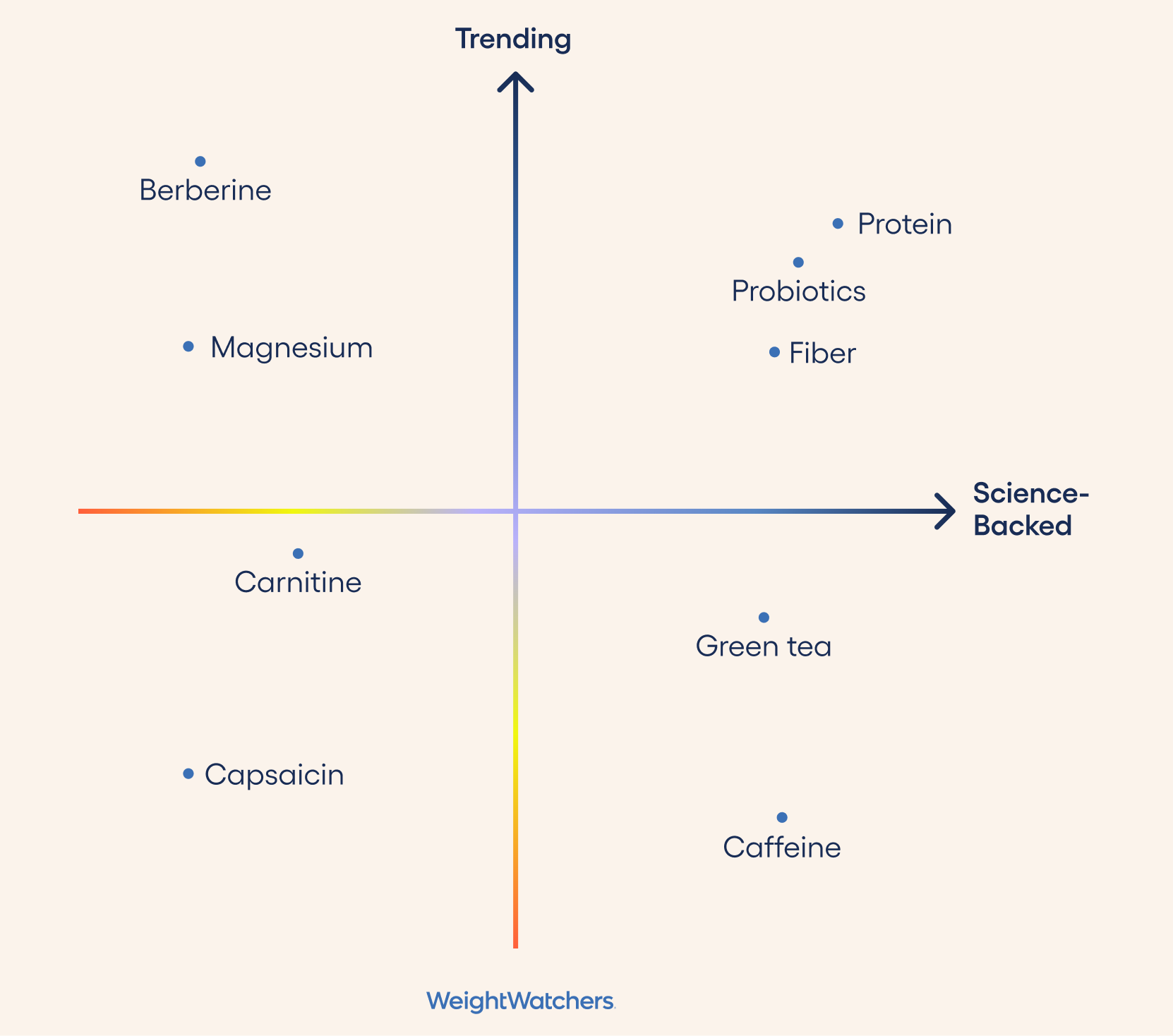5 supplements that support weight loss—and 4 that don’t


Say there’s some rare plant extract that’s taken over your TikTok, with people swearing it’s helping them lose weight effortlessly. Sound too good to be true? It probably is. Supplements — no matter what you take them for or how many people talk about them on the internet — are very loosely regulated. Because they’re considered “natural” nutritional boosters as opposed to actual drugs, brands (and people) can claim a lot about them without having much evidence to back it up. That leaves consumers in the dark, wandering the aisles of the drugstore simply hoping there’s something, anything on the shelves that could give them a leg up in losing weight. So…is there?
The WeightWatchers science team pored over the research so you don’t have to. “Overall, there’s limited evidence to suggest that supplements are effective for long-term weight loss,” says Kelli Richardson, Ph.D., RDN, the manager for clinical research and nutrition at WeightWatchers. “And they shouldn’t ever be considered a primary weight-loss strategy.” You need nutrition and movement to fill that role. That said, these boosters aren’t all a bust. Check out this handy matrix to understand which supplements have the most science on their side and which are mostly hype at this point.

Supplements showing promise for weight loss
Protein
Protein is a much-talked-about macronutrient for weight loss today — for good reason. The nutrient supports weight management by increasing satiety and promoting muscle mass maintenance, says Richardson, which is especially important during weight loss. “I recommend about 100 to 120 grams of protein per day for weight loss,” says Dr. Disha Narang, M.D., an endocrinologist, obesity, and culinary medicine specialist with Endeavor Health Medical Group in Skokie, IL. “But there’s such an obsession around protein that many people overdo it with all the supplements,” she says. It’s easy, considering you can even buy protein-fortified waters these days. Narang recommends getting protein through whole foods in your diet (lean meats, soy, and low-fat dairy), and relying on protein powders, shakes, and bars after workouts, as a snack, or if whole food options aren’t available — but not as a regular meal replacement.
If you are going for a protein supplement, she recommends choosing an option with whey, casein, egg white, or plant-based proteins (such as pea, soy, brown rice). And watch out: Some of these are basically protein-rich candy bars. Ideally, aim for one that has less than five grams of added sugar per serving.
Probiotics
Like protein, probiotics are evidence-based and they’re also getting a lot of play at the moment, because microorganisms like Lactobacillus and Bifidobacterium improve gut health — a very trendy wellness topic. While more research is needed to fully understand their weight-loss potential, a meta-analysis of data indicates that probiotics may help with weight loss, as well as a reduction in BMI, waist circumference, and body fat. Effects, however, were small. For instance, the average weight loss was about 1.5 pounds more than groups not taking probiotics. It’s unclear exactly why weight management may be one perk of probiotics, but it could be that they improve fat metabolism and insulin function.
If shopping for a supplement, know that strain matters. “Lactobacillus and Bifidobacterium are the strains that have the most evidence to support their use, and they’re unlikely to cause side effects,” says Richardson. (Some probiotics may cause gastrointestinal symptoms like gas or bloating). Don’t want to pay for a supplement? Richardson recommends eating “food sources of probiotics like yogurt, sauerkraut, tempeh, and kimchi.”
Fiber
Fiber is finally getting its flowers. As it should. Soluble fiber — a type of fiber found in foods like nuts, beans, lentils, and psyllium husk (found in Metamucil) — slows digestion to increase satiety, possibly helping you reduce calorie intake. Some studies have found that supplementation is associated with higher weight loss compared to control groups, says Richardson. However, given the limited research on specific forms of fiber supplements, she recommends getting fiber through whole foods first like vegetables, fruits, whole grains, legumes, nuts, and seeds when possible, advice Narang echoes.
According to the most recent Dietary Guidelines for Americans, women should aim to get 25 grams of fiber while men should go for 38 grams. If you know you're not getting enough fiber — like the vast majority of Americans — a supplement like psyllium may be helpful for digestive regularity, but more research is needed to determine its benefits for weight loss. Narang adds that taking too much in the way of fiber supplements can further constipation, so be sure to follow the dosage recommendations on the label.
Green Tea
It’s what powers your frothy, highly aesthetic morning matcha, and it’s also tried-and-true. One meta-analysis of 59 randomized controlled trials found that green tea extract was effective for reducing body mass, body fat percentage, and BMI. However, these effects were mild. For example, green tea supplementation was only linked to a 1.5 pound greater weight loss than those not using green tea. Green tea contains caffeine and catechins (antioxidant plant compounds like EGCG) that may help boost metabolism and reduce fat production and absorption in the body.
For safety, it’s better to consume a moderate amount of green tea as a beverage. Research shows that green tea extract is one of the common herbal supplements potentially associated with liver damage, says Narang. It’s not yet known why green tea may be toxic to the liver, so the best thing you can do is be cautious around supplements.
Caffeine
We wouldn’t call it buzzy, but it will give you a buzz. An appetite suppressant and stimulant, “caffeine promotes weight loss by increasing metabolism and breaking down fats in the body,” says Richardson. In a meta-analysis of randomized controlled trials, increased caffeine intake was associated with decreases in weight, BMI, and fat mass. There is less research on caffeine supplements, however, and it’s easy to get too much this way. Stick to a cup or two. The U.S. Food & Drug Administration recommends capping caffeine at 400 milligrams per day, or the amount in 24 to 36 ounces of coffee. Excessive caffeine intake can lead to side effects like jitters, anxiety, and headache, as well as creating tolerance, reducing its potential benefits.
Supplements that need more research
Berberine
Berberine — a chemical found in plants like goldenseal and barberry — has been dubbed “nature’s Ozempic” by TikTok talking heads. Unfortunately, this is a huge misnomer. Why? “There’s no such thing as nature’s Ozempic,” says Narang. “We have no supplement that has been shown to mimic what our prescription GLP-1 receptor agonists can do,” she explains. These medications, which include semaglutide (Ozempic, Wegovy) and tirzepatide (Mounjaro, Zepbound), act like the body’s own GLP-1 hormone, but in doses much larger than the body produces, to regulate insulin and blood sugar, decrease appetite, and slow down stomach emptying.
Berberine just can’t get close to these effects. An umbrella review of 13 meta-analyses concluded that berberine did not significantly decrease body weight, BMI, or waist-to-hip ratio, though it had some lipid-lowering benefits.
Magnesium
Although magnesium supplements are popular right now for sleep and digestion, the mineral’s benefits for weight loss are dubious at best. “While magnesium is essential for many bodily functions — including muscle and nerve function, blood sugar regulation, and energy production — its direct role in weight or fat loss is not strongly supported by research,” says Narang. While most trials show no benefit, some research shows that magnesium supplementation may be linked to a slightly lower waist circumference in people who have obesity. It’s not yet known why that is. Magnesium may support insulin sensitivity, which could promote metabolic health, says Narang. “However, it doesn’t mean taking extra magnesium will directly lead to fat loss,” she says.
What is clear is that most people don’t get enough, so it’s a good idea to incorporate magnesium-rich foods into your diet. Magnesium can be found naturally in foods like chia seeds, avocados, bananas, almonds, brown rice, and black beans, so you can get it through the diet rather than a supplement. Certain groups may be at risk of magnesium deficiency, including those with type 2 diabetes, gastrointestinal diseases like Crohn’s and celiac, and older adults. If that’s you, ask your doctor if they recommend taking a supplement. “If you’re supplementing, it should be based on individual needs — not hype,” says Narang.
Carnitine
Carnitine is derived from an amino acid — and it’s found in animal products like meat, poultry, fish, and dairy. Because carnitine may improve the breakdown of fats, it’s been linked with weight management, and research suggests that carnitine may help with small amounts of weight loss. A meta-analysis showed that L-carnitine supplementation led to weight losses of about 2.5 pounds more than those not using this supplement, but larger studies are needed to confirm whether supplementation can support such weight loss over the long run. Most of the time, you can get carnitine from your diet — and Richardson says research suggests we absorb the amino acid better from food anyway.
Capsaicin
It’s been touted as a weight-loss ingredient for a long time, but taking capsaicin may leave you disappointed. Capsaicin is the compound in chili peppers that gives them their kick, which may increase your body’s calorie burn and decrease your appetite and calorie intake. “There’s some evidence out there that suggests capsaicin can support reductions in body weight, BMI, and waist circumference,” says Richardson.
All sounds great, right? So why doesn’t it get the thumbs up from us? Well, the amount of research on capsaicin is still small, as is the amount of weight loss. A 2023 review and meta-analysis found just about a one pound difference between adults with overweight and obesity taking capsaicin compared to controls. What’s more, research hasn’t definitively shown that supplementing leads to meaningful weight loss, especially in the long term. Rather than a supplement, stick to firing up your foods with a sprinkle of cayenne, a dash of hot sauce, or slices of chili peppers.
The bottom line
Nutritional supplements are popular as ever, but they’re under-regulated and their benefits are often overblown. There are a handful that are backed by science to support minimal amounts of weight loss, but they can’t stand in for healthy habits like a nutrient-rich diet and regular movement. They include:
- Protein
- Probiotics (specifically Lactobacillus and Bifidobacterium)
- Fiber
- Green tea
- Caffeine
On the other hand, research is still too scant on the below:
- Berberine
- Magnesium
- Carnitine
- Capsaicin
Before starting any new supplements, no matter what they’re for, make sure to consult with your provider first to get the go ahead.
This content is for informational purposes only and does not constitute medical advice, diagnosis or treatment. It should not be regarded as a substitute for guidance from your healthcare provider.
Probiotics evidence: National Center for Complementary and Integrative Health. (2019). “Probiotics: Usefulness and Safety” https://www.nccih.nih.gov/health/probiotics-usefulness-and-safety
